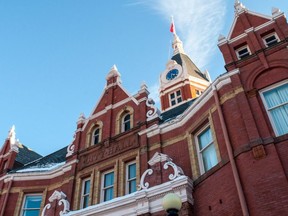Despite concerns brought forward by a local group of accommodators, Stratford council approved a three-year agreement with Destination Stratford to split municipal accommodation tax revenue equally between the city and the tourism organization.

A loose collective of Stratford hotel, motel, inn, bed-and-breakfast and short-term-rental-accommodation operators made it clear at a Stratford committee meeting Monday night they are not pleased that at least half of revenue collected from the city’s recently implemented municipal accommodation tax will go to support the city’s tourism organization, Destination Stratford.
Advertisement 2
Article content
At Monday’s finance and labor relations committee meeting, Stratford councilors received an update from city treasurer Karmen Krueger on the four-per-cent tourism tax on overnight guests staying for less than 30 contiguous days at local accommodations businesses that came into effect on July 1. Krueger also introduced a draft, three-year agreement between the city and Destination Stratford, which was ultimately approved by council Monday night and will allow the city to distribute municipal accommodation tax revenue equally between Destination Stratford and the city, as legislated by the province.
Article content
“In paragraph three of the (committee report), there’s a reference that funds must be spent in accordance with Destination Stratford’s strategic plan,” said Barb Shaughnessy, a representative from the Inn Keepers Collective, a loose association of legally operating and licensed accommodations businesses in Stratford. “What we don’t have right now to make that decision is they haven’t done that plan yet. You need to first see it in order to be agreeable to it.
Advertisement 3
Article content
“Our collective believes that the agreement is premature. More work needs to be done to get it right. Destination Stratford doesn’t have a strategic plan and no funds should go to them until a plan is approved by council, or at least you’ve seen it. Once again, we feel as a collective that you’re rushing ahead without complete information and consultation with the major stakeholders. That’s vital for transparency in government.”
In her report, Krueger said nine of the 14 motels, hotels and inns that were expected to collect this tourism tax from July through September did so, bringing in nearly $155,000 in tax revenue.
Meanwhile, a total of 72 bed and breakfasts and other licensed short-term accommodators registered with the city and the Ontario Hotel and Motel Association – the organization contracted by the city to collect and administer the tourism tax program – to report and remit the municipal accommodation tax from July through September. While some of those accommodators reported zero sales, together the 72 accommodators reported a little more than $850,000 in taxable sales and a little more than $30,000 of the $34,000 in tax revenue from those sales had been received by the city by Nov. 30.
Advertisement 4
Article content
After fees paid to the Ontario Hotel and Motel Association, the city and Destination Stratford’s shares of municipal accommodation tax revenue from July through September this year is a little more than $88,500 each. While the city has yet to receive the tax revenue from the remainder of the year, Krueger said it will be less than what was collected during the summer months.
“Our concern is the 109 illegal accommodations that aren’t registered,” Shaughnessy said. “Why I bring that up is we figure it’s close to $200,000 a year loss in revenue for (the municipal accommodation tax). I think most people don’t understand that just because you’re not licensed doesn’t mean you don’t have to pay. So we’re here to ask what actions the city is going to take to collect the 2023 (tourism tax) retroactively from unlicensed and non-compliant providers.”
Advertisement 5
Article content
Speaking to some of the concerns brought forward by the collective, Krueger said this financial agreement is a required prerequisite before funds can flow to Destination Stratford and be put toward local tourism initiatives. While the agreement, which is based on provincial legislation, doesn’t identify specific projects and initiatives that the tourism-tax revenue can be spent on, it does state that both the city and Destination Stratford are required to spend that funding on tourism-related initiatives.
“It’s broad, but that’s on purpose to give flexibility to councils,” Krueger said, agreeing with a point brought forward by Coun. Jo-Dee Burbach that tourism-related initiatives could include city infrastructure projects that benefit both locals and tourists alike.
Specific projects that can make use of tourism-tax funding, Burbach pointed out later, will be identified during city and Destination Stratford budget deliberations for 2024.
As for ensuring unlicensed short-term-rental accommodations pay their fair share in municipal accommodation tax, Stratford director of building and planning Adam Betteridge told the committee that the city’s bylaw-enforcement department has been short staffed this year, resulting in delays responding to and addressing complaints of unlicensed accommodators.
Article content